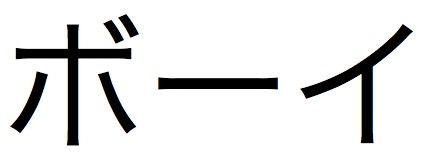Apologies for the lack of posts. They should hopefully resume at a more regular pace shortly now that I’ve 1) finished my graduate studies, 2) found a job (one that will keep me in contact with the Japanese language!), 3) moved to the city where I do that job, and 4) almost moved into an apartment in that city. Until Wednesday, I am living with my brother who, conveniently, also lives in that city.
[I’m not really trying to keep secrets. I moved to Chicago, the Windy City, which feels more poetic in Japanese: 風の街 (The City of Wind).]
I’m still working my way through Tazaki Tsukuru, and as I was reading today, I noticed an awesome 外来語 inequality. (MILD SPOILER ALERT: The example details one minor plot point from the new Murakami book.) Tazaki Tsukuru has arrived in Finland to track down a high school friend, and when he gets to his hotel, this happens:
ハンサムな金髪のボーイに案内され、クラシックなエレベーターに揺れられて、四階にある部屋に入った。
As you can see from the katakana, there are a number of foreign words, but “handsome,” “classic,” and “elevator” all match up pretty smoothly with their English equivalents. ボーイ on the other hand, varies a little more. This translation, for example, is a little off:
A handsome, blonde boy guided him into a shaky, caged elevator and up to his room on the fourth floor.
This makes much more sense, no?
A handsome, blonde bellboy guided him into a shaky, caged elevator and up to his room on the fourth floor.
Forget the fact that I’ve smoothed out the listed clauses and the fact that Tsukuru is the subject of every verb in the Japanese, and focus on how much more natural “bellboy” is in that sentence.
This word doesn’t really pass the Google Images test (at least not for ボーイ), but if you add ホテル, it becomes clear that ボーイ = bellboy in many if not most cases, in practical usage.
I love the long vowel here, although I admit that it’s mostly because it makes me think of Flava Flav: YEAHHHHHHH BOYYYYYYYYYYY!


Also used for waiters! Pretty much any service industry job usually filled by young men. (Nice silent adaptation of “classic” there too. I don’t think anyone but an elevator buff would say that in English, but maybe the 60s revival reaches further than I realize.)
Congratulations on finishing grad school and finding a job! What exactly is it?